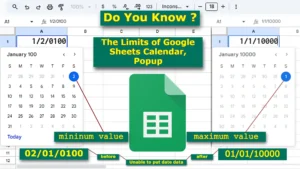
The COUNT and LEN functions in Google Sheets are used to measure data in terms of quantity and length, but they serve different purposes and use different arguments.
COUNT Function
The COUNT function used specifically to count cells containing numeric data (numbers) within a range (for e.g. Column 1, 3, 6, 7 and 8 as shown below). It doesn’t count cells with text (for e.g. Column 2, 4, 6, 7, 8 and 9) or empty — it only focuses on numbers. This function is particularly useful when you want to know how many numerical entries are present in a list or a column, like counting scores, prices, or other quantitative data.

- Column 4 (D4:D8): Contains text values only, similar to Column 2, with the result showing as 0.
- Column 6 (F4:F14): Contains a mix of numbers, dates, and text. The
COUNTfunction returns 7, counting only the numeric and date values while ignoring text cells.
Understanding How the COUNT Function Work in Google Sheets:
- Column 1 (A4:A8): Contains date values only; when you press enter, the result returned by the
COUNTfunction is 5.

- Column 2 (B4:B8): Contains text values only, with the result showing as 0 since
COUNTignores text values.

- Column 3 (C4:C8): Contains only numbers, and the
COUNTfunction result is 5, counting each numeric entry.

- Column 7 (G4:G17): Similar to Column 6, with a mix of numbers, dates, and text. However, here the
COUNTfunction returns 4, again ignoring any text cells.

- Column 8 (H4:H10): Contains both numbers and text. The text cell H9 has “₹5” (rupee symbol + number), which Google Sheets treats as text and excludes from the count. However, “H10” with “$5” (dollar symbol + number) is treated as numeric, so
COUNTincludes it with five other numeric cells, showing a result of 6.

- Column 9 (I4:I17): Contains text values only, similar to Column 2 and 4, with the result showing as 0.

Syntax
COUNT(value1, [value2,....])
Arguments
- The first range or value (
value1) to consider for counting. This is a required argument. - Additional values or ranges (
value2,...) to consider for counting. These are optional.
Example
=COUNT(A4:A8)
This formula counts the number of numeric entries in the range A4:A8 as shown above. If cells A4 through A8 contain some numbers, some text, and some empty cells, COUNT will return the count of only the numeric entries. If you want to count cells with any data type, you would use the COUNTA function instead.
The Importance of COUNT and LEN Functions in Data Analysis
Instead of using the COUNT function, which specifically counts the number of cells containing numeric values in a given range, the LEN function serves a different purpose by measuring the length of a text string.
The LEN function counts all characters within the string, including letters, numbers, spaces, and punctuation. This distinction is crucial for tasks where understanding the size of text data is necessary, such as when assessing input lengths for forms or ensuring proper formatting.
Therefore, while the COUNT function is useful for quantifying numeric data, the LEN function provides insights into the composition of text. This makes LEN essential for text analysis and manipulation in Google Sheets, allowing users to effectively manage and evaluate text data in their spreadsheets.
How to Generate New Year Calendar, have Easy Way in Google Sheets
Understanding the LEN Function for Effective Text Analysis
Understand the LEN function, which is helpful when you need to analyze the length of text entries, such as checking if a description fits within a character limit. By accurately measuring text length, the LEN function assists in ensuring proper formatting and adherence to data requirements.
Syntax
LEN(text) or LEN(A4)
Arguments
The text string whose length you want to calculate. This can be a cell reference or a direct text entry, such as “countLen”.
Example
=LEN(A4)
If cell A4 contains “countLen”, then =LEN(A4) will return 8 because there are eight characters in “countLen” with no spaces, as shown below.


=LEN(C4)
If cell C4 contains “count Len” (note the space between “count” and “Len“), then =LEN(C4) will return 9 because the space counts as an additional character as shown above.
- Spaces: Spaces between words or characters are included in the character count.
- Symbols and Punctuation: Symbols like @, #, or currency symbols (₹, $) are also counted as individual characters.
- Numbers: Numbers are counted in the same way as any other character.
The below image shown the result count the characters “t”. In this case the LEN function count only lower characters “t”.
=LEN(A3)-LEN(SUBSTITUTE(A3, "t", ""))

If you want to count the all characters “t” than use the below functions.
=LEN(A3)-LEN(SUBSTITUTE(LOWER(A3), "t", ""))

If you want to count only first words characters than use the below function. In this case the SEARCH formula check the space in the cell value and than outcome the result, if their is no any space than its return the error #VALUE! as shown below.
=LEN(LEFT($A3,SEARCH(" ",$A3,1)-1))

If you want to count the all characters “N” than use the below functions.
=LEN(A3)-LEN(SUBSTITUTE(UPPER(A3), "N", ""))

Key Difference Between COUNT and LEN
COUNT is for counting numeric entries in a range.
LEN is for calculating the number of characters in a specific text string.








